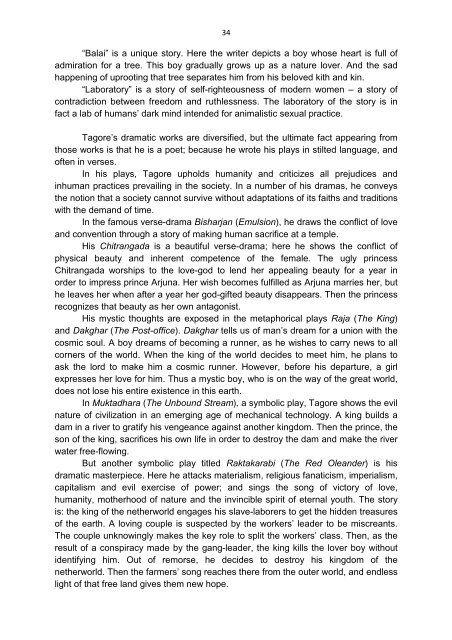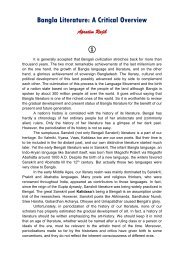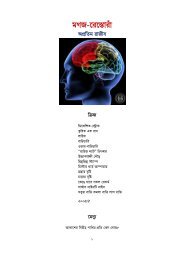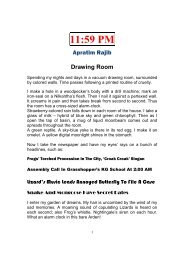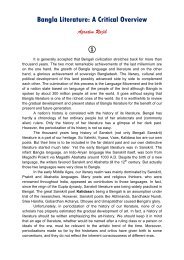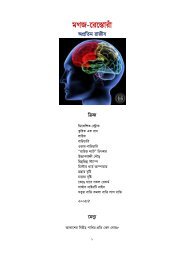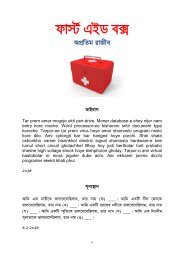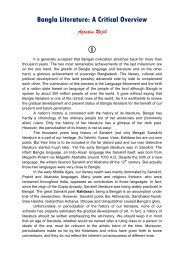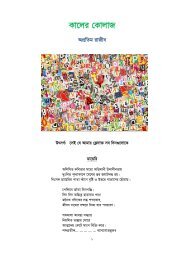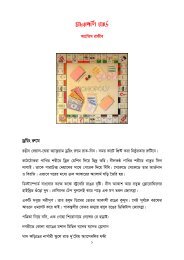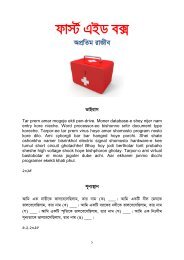BLiterature-Apratim
Create successful ePaper yourself
Turn your PDF publications into a flip-book with our unique Google optimized e-Paper software.
34<br />
“Balai” is a unique story. Here the writer depicts a boy whose heart is full of<br />
admiration for a tree. This boy gradually grows up as a nature lover. And the sad<br />
happening of uprooting that tree separates him from his beloved kith and kin.<br />
“Laboratory” is a story of self-righteousness of modern women – a story of<br />
contradiction between freedom and ruthlessness. The laboratory of the story is in<br />
fact a lab of humans’ dark mind intended for animalistic sexual practice.<br />
Tagore’s dramatic works are diversified, but the ultimate fact appearing from<br />
those works is that he is a poet; because he wrote his plays in stilted language, and<br />
often in verses.<br />
In his plays, Tagore upholds humanity and criticizes all prejudices and<br />
inhuman practices prevailing in the society. In a number of his dramas, he conveys<br />
the notion that a society cannot survive without adaptations of its faiths and traditions<br />
with the demand of time.<br />
In the famous verse-drama Bisharjan (Emulsion), he draws the conflict of love<br />
and convention through a story of making human sacrifice at a temple.<br />
His Chitrangada is a beautiful verse-drama; here he shows the conflict of<br />
physical beauty and inherent competence of the female. The ugly princess<br />
Chitrangada worships to the love-god to lend her appealing beauty for a year in<br />
order to impress prince Arjuna. Her wish becomes fulfilled as Arjuna marries her, but<br />
he leaves her when after a year her god-gifted beauty disappears. Then the princess<br />
recognizes that beauty as her own antagonist.<br />
His mystic thoughts are exposed in the metaphorical plays Raja (The King)<br />
and Dakghar (The Post-office). Dakghar tells us of man’s dream for a union with the<br />
cosmic soul. A boy dreams of becoming a runner, as he wishes to carry news to all<br />
corners of the world. When the king of the world decides to meet him, he plans to<br />
ask the lord to make him a cosmic runner. However, before his departure, a girl<br />
expresses her love for him. Thus a mystic boy, who is on the way of the great world,<br />
does not lose his entire existence in this earth.<br />
In Muktadhara (The Unbound Stream), a symbolic play, Tagore shows the evil<br />
nature of civilization in an emerging age of mechanical technology. A king builds a<br />
dam in a river to gratify his vengeance against another kingdom. Then the prince, the<br />
son of the king, sacrifices his own life in order to destroy the dam and make the river<br />
water free-flowing.<br />
But another symbolic play titled Raktakarabi (The Red Oleander) is his<br />
dramatic masterpiece. Here he attacks materialism, religious fanaticism, imperialism,<br />
capitalism and evil exercise of power; and sings the song of victory of love,<br />
humanity, motherhood of nature and the invincible spirit of eternal youth. The story<br />
is: the king of the netherworld engages his slave-laborers to get the hidden treasures<br />
of the earth. A loving couple is suspected by the workers’ leader to be miscreants.<br />
The couple unknowingly makes the key role to split the workers’ class. Then, as the<br />
result of a conspiracy made by the gang-leader, the king kills the lover boy without<br />
identifying him. Out of remorse, he decides to destroy his kingdom of the<br />
netherworld. Then the farmers’ song reaches there from the outer world, and endless<br />
light of that free land gives them new hope.


